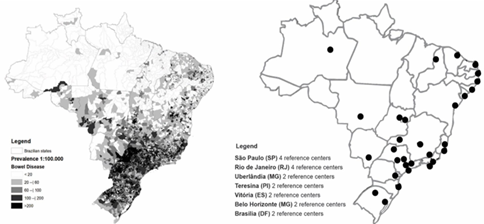HIGHLIGHTS
- In Brazil, there is no validated methodology for evaluating health services recognized as comprehensive care units (CCU), making it difficult to assess the quality of care provided.
- Most CCU were concentrated in the Southeast region and only one (2.4%) in the Northeast region of Brazil. This pattern follows the epidemiological trends of IBD in the country.
- There is still difficulty in accessing enteroscopy and/or small bowel capsule endoscopy in the public health system.
- Most centers have dedicated multidisciplinary teams and IBD specialist doctors.
- There is still a current need to improve the proportion of nurses treating IBD in Brazil.
ABSTRACT – Background –
The most efficient way to prevent complications from inflammatory bowel disease (IBD) is to provide patients with optimized care. Nonetheless, in Brazil, there is no validated methodology for evaluating health services recognized as comprehensive care units (CCU), making it difficult to assess the quality of care provided. Objective – To understand the current scenario, map the distribution of centers and identify strengths and weaknesses, considering local and regional characteristics. Methods – The study was carried out in three phases. Initially, the Brazilian Organization for Crohn’s disease and colitis (GEDIIB) developed 22 questions to characterize CCU in Brazil. In the second phase, all GEDIIB members were invited to respond to the survey with the 11 questions considered most relevant. In the last phase, an interim analysis of the results was performed, using the IBM SPSS Statistics v 29.0.1.0 software. Descriptive statistics were used to characterize the center’s profile. The chi-square test was used to compare categorical variables. Results – There were 53 responses from public centers (11 excluded). Most centers were concentrated in the Southeastern (n=22/52.4%) and only 1 (2.4%) in the Northern region of Brazil. Thirty-nine centers (92.9%) perform endoscopic procedures, but only 9 (21.4%) have access to enteroscopy and/or small bowel capsule endoscopy. Thirty-three centers (78.6%) offer infusion therapy locally, 26 (61.9%) maintain IBD patient records, 13 (31.0%) reported having an IBD nurse, 34 (81.0%) have specific evidence-based protocols and only 7 (16.7%) have a patient satisfaction methodology. In the private scenario there were 56 responses (10 excluded). There is also a concentration in the Southeastern and Southern regions. Thirty-nine centers (84.8%) have access to endoscopic procedures and 19 perform enteroscopy and/or small bowel capsule endoscopy, more than what is observed in the public environment. Infusion therapy is available in 24 centers (52.2%). Thirty-nine centers (84.8%) maintain a specific IBD patient database, 17 (37%) have an IBD nurse, 36 (78.3%) have specific evidence-based protocols, and 22 (47. 8%) apply a patient satisfaction methodology. Conclusion – IBD CCU in Brazil were mainly located in the Southeastern and Southern regions of the country. Most centers have dedicated multidisciplinary teams and IBD specialists. There is still a current need to improve the proportion of IBD nurses in IBD care in Brazil. Keywords – Crohn disease; ulcerative colitis; health care; health facility accreditation; outcome and process assessment.
AUTORES
Abel Botelho QUARESMA1,9, Ludmila Resende GUEDES2,3, Jaqueline Ribeiro de BARROS4, Júlio Pinheiro BAIMA5,6, Marcello IMBRIZI7, Marco Antônio ZERÔNCIO8, Paulo Gustavo KOTZE9, Cristina FLORES10, On behalf of GEDIIB


